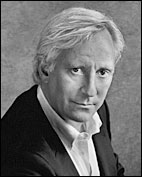 Current Location: Washington, D.C.
Current Location: Washington, D.C.
Current Gig: Executive Producer, America, BBC News (former ONA Board member)
Member Since: October 2007
Six-word memoir: …am I right, am I wrong.
Favorite fictional character: Sam Gribley from “My Side of the Mountain.”
Favorite tech tool: The word processor.
What happens during your average day?
More things than I can attend to properly. Right now I am new to the BBC so I am trying to summit a huge learning curve — studying a new and large organization — its culture, challenges, ambitions and capacities. There’s a lot of reading. And, of course, spending time with new colleagues. That is consuming at the moment. I stay on top of the news as much as possible so I can be useful to my colleagues trying to cover America.
Why did you choose to get involved with online media?
I believe I was chosen — or instructed to, at least. It happened, I like to say, in the very last month of the 20th century. In December 1999, I was asked if I would like to help steer CBSNews.com. I said yes immediately.
What is the greatest challenge covering news for different types of audiences in different countries?
I don’t think I know the answer to that yet. What I’d know is that is a very, very complicated business. For example, bbc.com/news has a huge presence for American users, but those people aren’t coming to us for the same coverage they get from the large domestic site. Figuring out that mix is quite challenging, just as it is on the broadcast side. My career has been immersed in domestic news and politics, and the American market, so I am looking at some of these issues with very fresh eyes. It is invigorating.
You were behind the lines during a conservative protest against NPR. How do you think our current political environment has impacted how we fund, report and analyze the effectiveness of news?
First, I think the American media have contributed to the obnoxious and polarized political climate that we complain about so loudly. And as a profession, I don’t think we are honest or accountable about that. So I think, unfortunately, American media and “our current political environment” are really one and the same. In very, very sweeping terms, just as campaigning has replaced governing as the primary activity of politicians, peddling and packaging the commodity formally known as “the news” is primary activity of most commercial news operations in America. Politics and the press have a mutually parasitic relationship where we drag each other down in the public’s esteem. That is a more dangerous trend than the fleeting partisan attacks on organizations such as NPR.
If you could hit a reset button that would take you back to a crucial career decision, what would happen, and would you alter the decisions you made back then?
Well, honestly, I will always wonder if it was a mistake to pursue management and leadership instead of writing full time. I am not at all sure that I would decide differently than I did, but it nags. Nor am I sure I can have paid the bills that way. Luckily, I can always return to some kind of writing and more contemplative work later. I hope.
If you had a million dollars dedicated to improving media, you would …
Treat it as a book advance and tell you what I really think, at length.

